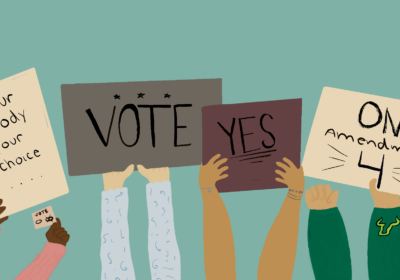OPINION: Media literacy courses could combat threats to American democracy

President Biden delivered a speech at a campaign reception on Thursday in which he posed a critical question to the American people: “What will we do to maintain our democracy?”
Biden emphasized the need to restore trust in democratic institutions and referenced polarization, the division of opposing ideology, as a core concern. Intolerance to conflicting views is establishing a democracy at the mercy of partisan divides.
American democracy is under threat, and this issue is only amplified by biased news outlets and ideological echo chambers generated by internet algorithms. By mandating thorough media literacy courses in universities, we can prevent further political polarization and empower a more informed voter base.
Media literacy is defined as “the ability to critically analyze any story or event presented in the media and to determine its accuracy or credibility.”
The internet has allowed the media to widen its scope and its delivery, but simultaneously narrow the perspectives users consume. Many receive their news from social media – particularly college students. At USF, 35.2% of students admit to receiving news from social media.
Social media algorithms analyze user clicks to tailor users’ feed to feature more of what they regularly consume. Companies like Facebook curate news feeds based on predictive factors such as likes, follows and views. In terms of political and news content, this structure creates an echo chamber of information, ideology and influence.
Social media algorithms have even been credited for polarization and the instigation of hate speech and political violence, according to an August paper by Columbia University’s Knight First Amendment Institute.
The systems put in place by social media companies like Facebook reduce the perspectives users are exposed to. Naturally, polarizing patterns are likely if consumers are not receiving news from various viewpoints.
“We have moved from broadcasting to narrowcasting,” said former President of the Council on Foreign Relations Richard Haass in his 2023 book “The Bill of Obligations.”
“Many gravitate to outlets that reflect not just their interests, but their biases. Missing is any quality control. Misinformation is rampant, balance rarely found.”
All sources are not equal – many are biased. Of 70 major news media outlets, 43% were very politically biased and 37% were slightly politically biased, according to an analysis by AllSides. Additionally, citizens are 30% less likely to follow news stories that conflict with their views.
Media no longer serves as a means of informing citizens, but rather as an instigator of polarization. Students must understand their responsibility to educate themselves with information rooted in fact, and to recognize and work toward the public good despite common divisive ideology.
But in order to do so, they must learn the skills to recognize biased sources through media literacy.
Beyond polarization, the media facilitates the rapid exposure of disinformation, or false content deliberately created for distribution. Unfortunately, disinformation is very present online, and particularly on social media.
This false information not only prevents users from receiving factual news, but it is also used by creators to take advantage of the uninformed. Disinformation surrounds incredibly important news such as U.S. elections, COVID-19 and the Russian invasion of Ukraine, according to a March 2022 article by The Hill.
Misinformation on social media even resulted in real political violence in 2020 as demonstrated by the Jan. 6 riots.
The media only aggravates the flaws of democracy, therefore threatening its future. Despite the grave nature or these issues, there are solutions. And they can begin in universities like USF through media literacy education.
Media literacy is vital in identifying false information online. By requiring a course in media literacy and current events, USF can combat these issues and help create an informed student population.
While USF currently requires an Ethical Reasoning and Civic Engagement course for graduation, these courses do not focus on media literacy or civic duty. Universities such as UF or FSU do not require media literacy courses for graduation, but they do offer courses and graduate study for the topic.
USF must adapt to critical needs and develop a new course to immerse students in national and global affairs and teach critical analysis and civic engagement. If students graduate understanding the importance of media literacy as a democratic duty, American democracy has a second chance.
Media is now a vast institution capable of demonizing government officials, lying about public health, weaponizing social media and diminishing democracy.
However, universities can be the catalyst to restoring an informed population by instilling the value of democracy and providing students with the skills to sustain it.






